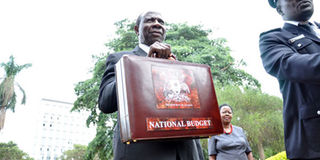Shortfall stands at Shs1.8t as MPs approve budget paper

Parliament has approved the Budget Framework Paper (BFP) for 2020/21 Financial Year and tasked Finance minister Matia Kasaija to look for Shs1.86 trillion needed to cater for unfunded priorities in the pre-election year budget. FILE PHOTO
What you need to know:
Lawmakers tasked the government to find money for the Electoral Commission, of which Shs134.21b is required for implementing electoral road map, while Shs11.79b is required to enable the electoral body establish offices in 23 new districts.
Parliament has approved the Budget Framework Paper (BFP) for 2020/21 Financial Year and tasked Finance minister Matia Kasaija to look for Shs1.86 trillion needed to cater for unfunded priorities in the pre-election year budget.
The House dashed to beat the February 1 deadline and adopted the BFP, a blueprint for next financial year’s Shs39.6 trillion budget.
Lawmakers tasked the government to find money for the Electoral Commission, of which Shs134.21b is required for implementing electoral road map, while Shs11.79b is required to enable the electoral body establish offices in 23 new districts.
For instance, the lawmakers tasked the Executive to look for Shs36b to support the Kiira Motors project, acquire land and also roll out its operations in regional centres; and Shs8.84b for the Presidential Initiative on Banana Industrial Development.
Other unfunded projects include the facilitation of Resident District Commissioners to do their work (Shs3.5b), poverty alleviation (village model) under State House (Shs7.3b); Mobilising of masses towards poverty reduction (Shs18.5b) and the fight on pornography (Shs1.85b.)
The Ministry of Defence needs additional requirement for External Intelligence Organisation to a tune of Shs11.89b, while the Office of the Prime Minister is to be added additional funds to cater for affirmative action on regional scale.
Shs71.5b is required for affirmative action, with Shs40b earmarked for northern Uganda, Shs12b for Teso Affairs, Shs10b for Bunyoro Affairs, and Shs9.5b for Busoga Affairs.
The total resource inflow envisaged by the Cabinet indicated a reduction of two per cent from Shs40.48 trillion in FY 2019/20, which was also premised on a projected decline in external financing.
Tax revenue is projected to increase from Shs18.82 trillion in FY2019/20 to Shs20.04 trillion in FY2020/21, registering an increment of six per cent, with tax to GDP projected to increase from 12.4 per cent in 2018/19 to 12.8 per cent in 2020/21.
By 2024/25, the government forecast indicates that tax to GDP will have increased to 14.7 per cent.
The Parliament Budget Committee noted that this would be still lagging behind the sub-Saharan average of 20 per cent, according to the International Monetary Fund projections of 2012.
MPs, however, questioned why the government could not provide for such critical areas of investment in the budget framework, and instead promise to mobilise additional resources on top of the Shs39.6 trillion before the budget for FY 2020/2.
If the recommendations of Parliament are adopted, the Budget will jump to Shs41.4 trillion.
Government is, however, expected to make more alterations that might see the budget jump further to about Shs45 trillion.
For the next financial year, the government intends to generate domestic revenue worth 21.54 trillion, compared to 20.4 trillion earmarked for the current financial year.
The revenue target indicates a 1.09 rise in revenue.
The government also hopes to generate local revenue for local governments to a tune of Shs201.1b, while domestic refinancing will contribute Shs7.36 trillion.
Government also intends to borrow internally to a tune of Shs3.05 trillion, while another 7.36 trillion is expected from recycled internal debt known as domestic refinancing.
Government also intends to tap Shs3.05 trillion from domestic finance, mainly through borrowing and Bank of Uganda recapitalisation.
Budget support is expected to raise up to Shs862.6b, while project support through external funding is projected at Shs6.61 trillion.
Sector allocation in terms of sectoral allocation, works and transport will account for 15.1 per cent, with the largest sectoral allocation of Shs5.95 trillion, followed by education at 8.3 per cent of the total sectoral allocation.
The share of debt payments (interest, amortisation, domestic refinancing, domestic arrears) is 32 per cent (or Shs12.59 trillion) of the total budget for the FY2020/21, which the MPs said “is higher than the approved budget of FY2019/20, which was at 26.6 per cent.”
The stock of tax arrears is steadily growing from Shs1 trillion in FY2013/14 to Shs3.6 trillion as at end of FY 2018/19.
The stock of tax arrears has grown effectively by Shs2.6 trillion (or by 260.5 per cent) in five years, despite some recoveries by the taxman.




